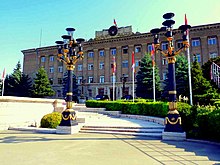Politics of Artsakh
 |
|---|
|
|
Politics of Artsakh takes place in a framework of a presidential representative democratic republic, whereby the President of Artsakh is the head of state and the head of government, and of a multi-party system; as of 2009, American-based non-governmental organisation Freedom House ranks the Nagorno-Karabakh Republic above both Armenia and Azerbaijan in terms of political and civil rights.[1][2][3] Executive power is exercised by the government. Legislative power is vested in both the Government and the National Assembly. The republic is de facto independent and de jure a part of Azerbaijan. None of the elections in Nagorno-Karabakh are recognised by international bodies such as the OSCE Minsk Group, the European Union and the Organisation of Islamic Cooperation, as well as numerous individual countries, such as Azerbaijan and Turkey, who also condemned and called them a source of increased tensions.[4][5][6]
Executive branch
| Office | Name | Party | Since |
|---|---|---|---|
| President | Bako Sahakyan | Independent | 7 September 2007 |
The President is directly elected for a five-year term, by popular vote.
Current government
The incumbent government of Artsakh is a coalition government formed by the Free Motherland, Democratic Party, and the ARF and is led by Bako Sahakyan. It was formed on 25 September 2017 after presidential elections in 2017.
Legislative branch

The National Assembly (Azgayin Zhoghov) has 33 members elected for a five-year term, 16 in single seat constituencies and the remaining 17 by proportional representation. Artsakh has a multi-party system, with numerous political parties in which no one party often has a chance of gaining power alone, and parties must work with each other to form coalition governments.
Recent elections
2015 parliamentary election
Template:Nagorno-Karabakh legislative election, 2015
2017 presidential election
See also
- Electoral calendar
- Electoral system
- Elections in Artsakh
- Foreign relations of Artsakh
- List of political parties in Artsakh
- Armenakan Party (Nagorno-Karabakh)
- National Assembly (Artsakh)
- Politics of Armenia
References
- ^ freedomhouse.org: Map of Freedom in the World, Freedom House, 2009
- ^ freedomhouse.org: Map of Freedom in the World, Freedom House, 2009
- ^ freedomhouse.org: Map of Freedom in the World, Freedom House, 2009
- ^ "EU does not recognize 'elections' in Nagorno Karabakh". News.Az. 1 May 2015. Retrieved 7 June 2016.
- ^ Mustafa Pazarlı. "US will not recognize Nagorno-Karabakh's elections". Videonews.us. Retrieved 7 June 2016.
- ^ Mushvig Mehdiyev. "OIC condemns "elections" in Nagorno-Karabakh as illegal". AzerNews.az. Retrieved 7 June 2016.
